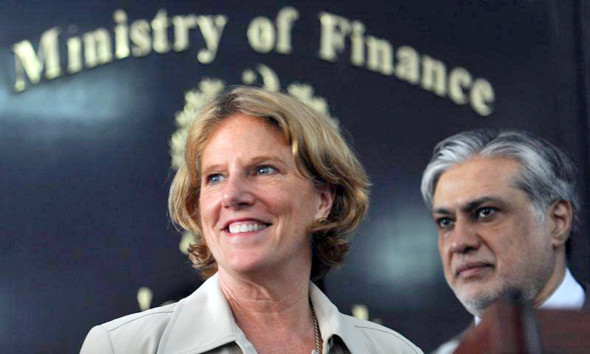The United States’ commitment to investing in Pakistan was reaffirmed with the visit of OPIC President Elizabeth Littlefield to Islamabad and Karachi in mid July. During her visit, she helped to clarify the United States’ long-term agenda with Pakistan and met with the new leadership and business community.
While addressing a business forum in Islamabad, Ms. Littlefield emphasised the United States’ intention to build deep partnerships and business to business relationships based on transparency and trust between the two countries. With an ambitious development agenda for Pakistan, OPIC is seeking local partners who uphold the highest standards of business practice.
With a wealth of experience in investing in frontier markets through her time at J.P Morgan where she was Managing Director in charge of capital markets and financing in emerging Europe, Middle East and Africa, Ms. Littlefield underlined that solutions to development problems are always local. Since OPIC works specifically within the private sector, it helps the U.S. gain a foothold in emerging markets. With the economic downturn in Europe, emerging markets hold great potential for investment. In fact, she spoke of her positive talks with Pakistan’s Board of Investment and how she was assured by senior officials that Pakistan’s culture of ‘red tape’ would be converted to a ‘red carpet’ for investors.
She said that while Pakistan’s energy problems, security and governance challenges may cause disquiet among investors, Pakistan’s large English speaking population, its wealth of untapped resources and the diaspora community are all major positives for investing in Pakistan.
OPIC, the U.S. government’s development finance institution, mobilises private capital to assist in overcoming urgent development challenges with the objective of advancing U.S. foreign policy. OPIC has a longstanding relationship with Pakistan dating back to 1971. Since 1975 OPIC has committed over $1.3 billion for 123 projects in Pakistan. Examples of OPIC assistance in Pakistan include providing capital to develop SME credit, infrastructure projects for water, telecommunications and real estate as well as renewable energy.
Renewable energy is the sector attracting great investor interest. Pakistan’s strong wind corridors at Jhampir and Gharo are ideal venues for wind power generation plants as a frequent challenge in wind energy projects is often the wind does not blow when you need it the most. Since Pakistan does not face this problem, wind energy holds out great potential.
OPIC is also helping Pakistan develop its alternative energy capability with $16.7 million for financing a 12MW carbon neutral biomass-fueled power plant that will utilise bagasse, a by product of sugarcane and rice husks and other plant wastes for fuel. These projects will help to bring about much needed diversification for Pakistan’s energy portfolio where prohibitively expensive fuel imports continue to exact a heavy toll on Pakistan’s import bill. Such projects can be of particular benefit in the rural areas which are still not connected to the national grid.
During her visit to the Karachi Stock Exchange with U.S. Ambassador Richard Olson, Ms. Littlefield reiterated the United States’ investor confidence in Pakistan. Though foreign direct investment (FDI) into Pakistan has declined precipitously in recent years, FDI from the United States between July 2012 and May 2013 was $213.6 million, which is over 16% of the total FDI Pakistan netted in the 11-month period.
Following his meeting with Ms. Littlefield, Pakistan’s Finance Minister Ishaq Dar said that the United States was willing to resume halted negotiations on the Bilateral Investment Treaty (BIT).
BOX ITEM
Elizabeth L. Littlefield, President & CEO, Overseas Private Investment Corporation (OPIC)
Elizabeth L. Littlefield was appointed by President Obama as the President and CEO of OPIC, the US Government’s Development Finance Institution. Operating in 105 countries, OPIC manages a $16 billion portfolio of financing and insurance to support private investment in sustainable economic development, especially in the world’s poorest countries. Under Littlefield’s leadership, OPIC’s annual commitments to renewable resources projects grew ten-fold in three years to $1.5 billion, while generating increasing income for the federal budget. She has also instituted major reforms of the agency’s policies, systems and processes and introduced new financial innovations to augment the agency’s development impact. From 2000 until 2010 Ms. Littlefield was Chief Executive Officer of CGAP (Consultative Group to Assist the Poor), a policy and research center dedicated to advancing poor people’s access to financial services. Housed at the World Bank, CGAP develops innovative solutions, promotes industry standards, provides market intelligence and data, and advises governments, financial institutions and investors. During that time Ms. Littlefield also served as a Director for the World Bank’s Financial & Private Sector division. Prior to joining CGAP in 1999, Ms. Littlefield was JP Morgan’s Managing Director in charge of capital markets and financing in emerging Europe, Middle East and Africa. Her responsibilities encompassed public and private financings for governments, corporations and banks, and related advisory work. In that role, she led the inaugural bond issues for the majority of the countries that tapped the markets for the first time in the 1990s. Prior to that she set up JP Morgan’s emerging markets debt trading department in London and was JPM’s Head Debt Trader for Africa, Eastern Europe and Asia. She also served as a Director in JP Morgan’s Paris office, among other positions. Ms. Littlefield has served on the Boards and Executive Committees of the MasterCard Foundation, Calvert Foundation and Women’s World Banking, among others. She was a founder of the Emerging Markets Charity in the UK. She currently serves on the President’s Export Cabinet, is the Chairperson of the World Economic Forum’s Global Agenda Council on Social Innovation and a member of the Council on Foreign Relations. Ms. Littlefield also spent 1989 – 1990 in West and Central Africa providing banking consultancy to several start-up microfinance institutions. She taught Financial Sector Development as an Adjunct Professor in the Masters Program at the School of Advanced International Studies (S.A.I.S.). She is a graduate of Brown University and also attended Ecole Nationale de Sciences Politiques in Paris.




